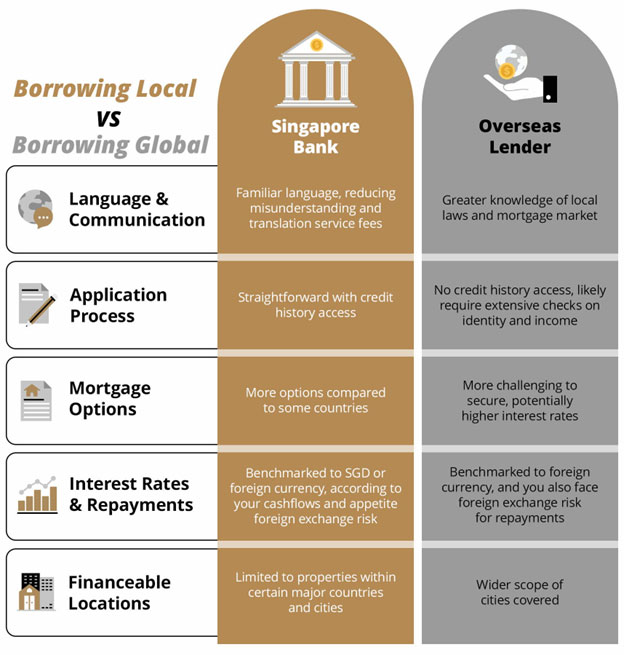Key points:
- For Singapore residents, borrowing from a bank in Singapore allows you to better manage your cashflow for an overseas property purchase.
- Besides getting better interest rates (future cashflows), the loan application process is more straightforward, and you’re more likely to get a loan from a Singapore bank than an overseas lender.
- You will also need to adhere to Singapore’s borrowing rules about property purchases.
Looking for a loan for your overseas property purchase?
Buying property overseas offers an adventure with many exciting possibilities. For instance, rental income, capital gains, as a holiday home, retirement home, or somewhere your child can stay during their university years.
But unlike planning for an overseas trip, this adventure goes far beyond just pinning down the location on a map. It comes with the challenge of navigating the cashflows surrounding the property purchase.
For those living in Singapore, the common choices are between borrowing from a Singapore bank or an overseas lender. Here are some factors for you to consider before taking up a property loan to finance your overseas property.
Borrowing from a Singapore bank vs Overseas lender

Those residing in Singapore may find themselves better off with a Singapore bank loan compared to a foreign bank loan.

Benefits of borrowing from a Singapore bank
Benefits:
- Loan arrangements are in a language you’re familiar with. Misunderstandings are less likely to arise from translation problems. You’ll also save money on translation service fees.
- More straightforward application process, as the Singapore bank can access your credit history, and is less likely to require extensive checks on your identity and source of income.
- Greater access to mortgage options. For instance, most Australian banks have stopped lending to foreigners after 20161. And most UK lenders require you to have at least a valid UK work permit, visa, permanent residency, permanent job, and/or a UK bank account2.
- Pay less in total, as you’re likely to be quoted interest rates that are significantly lower than what you would get as a foreign loan applicant3.
Cons:
- The properties you can buy will be concentrated in the major cities of a handful of markets.
Benefits of borrowing from an overseas lender
Benefits:
- Overseas lenders have greater knowledge of their local laws and mortgage market.
- Access to mortgage deals and non-bank lenders.
Cons:
- It’s more difficult to secure a mortgage from an overseas lender, and those who succeed are likely to face higher interest rates.
- You will need to manage foreign exchange risk, as your payments would be in a foreign currency.
Most Australian banks have stopped lending to foreigners after cases involving false documentations and possible money laundering1. Australian lenders who still lend to foreigners usually charge them 3%-4% more interest than Australian citizens and permanent residents1.
Managing your foreign currency cashflows

Lenders often allow borrowers to choose the currency of their loan, with the caveat that it should be related to the location. For instance, DBS allows a choice of SGD vs GBP loans for London properties, and SGD vs AUD loans for Australian properties.
Your choice of currency depends on these factors:
- Currency of your income & salary. If you’re earning a stable income in SGD, repaying an SGD-denominated loan allows you to skip the hassle of making regular currency conversions and trying to catch a favourable rate.
- Currency of rental income. If you will use rental Income from your foreign property to cover the mortgage, it could be more straight-forward to repay a mortgage in GBP or AUD.
- Longer-term currency expectations. If you believe the GBP or AUD will weaken against the SGD over the next few years, you could take out a foreign currency loan. If the GBP (or AUD) weakens as expected, you’ll pay less for your mortgage in terms of SGD. Conversely, if the GBP (or AUD) contradicts your expectations and strengthens, you’ll pay more in terms of SGD.
Managing your debt repayment cashflows

If you’ve chosen to pay for your overseas property with a Singapore bank loan, the application is still subject to Singapore regulations.
The top three rules (not an exhaustive list) affect: monthly debt repayments, how much you can borrow, types of property ownership.
1. Total Debt Servicing Ratio (TDSR): Impact on monthly debt repayments
The real purpose of TDSR is to help you see the real impact of taking on an additional loan. By limiting an individual’s monthly debt repayments to 55% of their gross monthly income, it prevents you from borrowing too much. The TDSR includes your car loans, credit card bills, and overseas property loans.
For a more conservative view of your finances, use your salaried income for “gross monthly income” in your overseas property mortgage application.
For a more holistic view that includes other financial assets, you can add these to the “gross monthly income” calculations: Singapore dollar deposits, and assets such as structured deposits, gold & debentures, stocks, etc.
Note: As the different banks may categorise specific assets differently and have additional rules on what proportion of the asset value can be recognised as gross monthly income, do get the latest details from your home financing specialist.
2. Loan-to-value (LTV): Impacts how much you can borrow
The LTV helps you compare the amount you can borrow with the appraised value of the property. As a borrower, a higher LTV helps to reduce your initial cash outlay.
We’ve observed a range of LTV being offered for overseas property loans. At DBS, the maximum LTV is 75% if you do not have any other Singapore home loans.
As LTV is dependent on the property value appraisal, you may receive a different quote for properties in different cities and suburbs. While each bank has their own way of making their assessment, it rests on these general principles:
- Age of property
- City where the property is located
- Neighbourhood and surrounding infrastructural developments
- Borrower’s age and loan tenure
- Borrower’s credit score or rating
- Long-term property market outlook
3. Minimum occupancy period (MOP): Impact on property ownership
The MOP was introduced to prevent HDB flat owners from making an easy profit on subsidised housing and is applicable to Singaporeans and Singapore permanent residents.
Those who currently own an HDB flat must have stayed in it for at least five years (10 years for Prime Location Public Housing flats) before being able to purchase residential property overseas.
And if you own an overseas property and want to buy an HDB flat, you’ll have to sell all your other residential properties within 6 months of purchasing the HDB flat.
Managing cashflows - foreign stamp duties and taxes

When expanding your property portfolio internationally, you will want to make a gain on your investment after paying for all related fees, which includes foreign stamp duties and taxes.
You’ll also need to maintain sufficient liquidity to pay for the foreign stamp duties and taxes at the right time. Your tax advisor will be able to provide advice on all additional costs such as valuation and legal fees.
For instance, foreign buyers of UK and Australia properties will need to ensure you’ve got the cash for these stamp duties during the purchase process:
Country | Foreign stamp duties |
|---|---|
United Kingdom |
|
Australia |
|
(Read more: Cost considerations when purchasing a foreign property.)
Partnering with a good team of experts

When it comes to purchasing property overseas, the process is eased by having a good team of experts behind you:
- Overseas real estate agency and lawyers to guide you through the selection and purchase process
- Mortgage specialist to provide loan options and assist with your application
- Relationship manager to help you achieve the necessary liquidity to make the payments.
Partnering with the right overseas property lender puts you ahead and enables you to better meet your wealth needs. With DBS Treasures, you’ll get access to the Overseas Property Financing facility, be assisted by your mortgage specialist, and get advice from your Relationship Manager on navigating your cashflows like a pro.
Ready to transform your overseas property dreams into reality? Partner with the right lender and take control of your wealth journey today! Simply leave your contact details and you’ll hear back from us within 3 business days.
1 Home Loan experts, 18 October 2023. “Foreigner Mortgage”. https://www.homeloanexperts.com.au/non-resident-mortgages/foreigner-mortgage/
2 better.co.uk, 20 October 2023. “Buying property in the UK (non-UK residents)”. https://better.co.uk/mortgages/buying-property-in-the-uk-from-abroad
3 Get Golden Visa, 6 July 2023. “Buying Property in the UK: A Guide for Foreigners”. https://getgoldenvisa.com/buying-property-in-the-uk
Disclaimers and Important Notices
This article is meant for information only and should not be relied upon as financial advice. Before making any decision to buy, sell or hold any investment or insurance product, you should seek advice from a financial adviser regarding its suitability.





